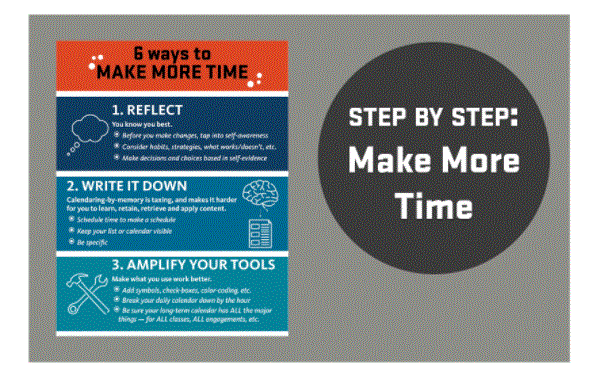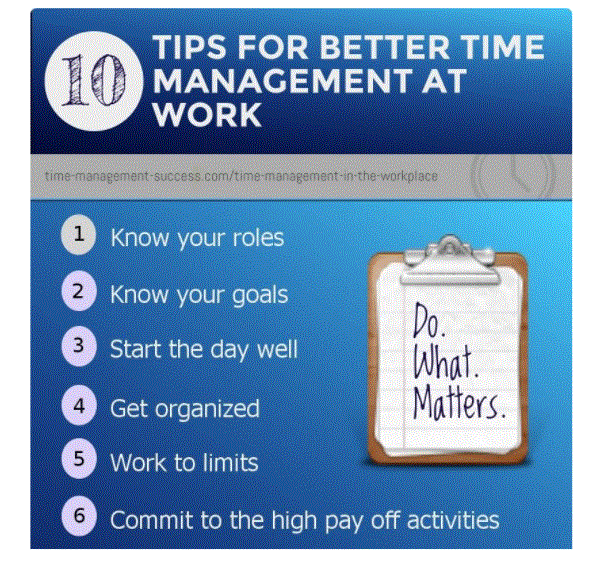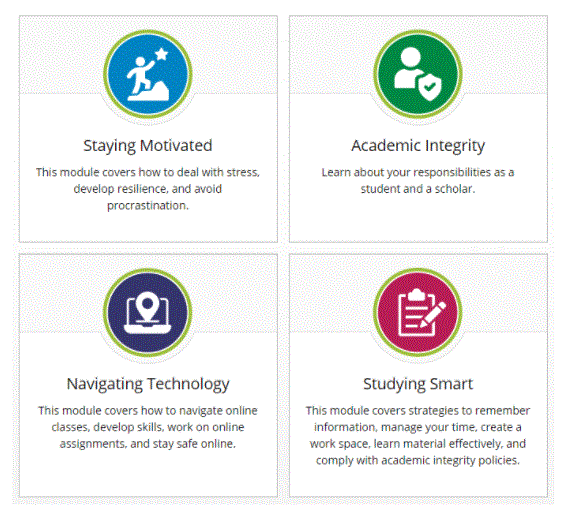
- The first time management tool you need is a time planner that includes everything you need to plan and organise your life. The best time planner, whether loose leaf or electronic version, enables you to plan for the year, month, week and each day.
- A good time planner will have a master list where you can capture each task, goal, or necessary action as it unfolds. This master list then becomes the core of your time-planning system. From this master list, you assign different tasks to different months, weeks and days.
- Every effective executive works from a daily master list. It’s the most powerful tool ever discovered for maximum productivity and one of the best ways to help you achieve your SMART goals. When you create your daily to-do list, you start by writing down every single task you want to accomplish throughout the day.
- The rule is that the day you start using a list, you will increase your efficiency by 25%. This means that the simple act of making a list of everything you need to do before you start work will give you two extra hours of productive time in an eight-hour day. You can break out of chaos faster with Lists than with any other time management tool.
Use a Time Planner and Create a Master List:
Work from a list:

- Once you have a master list for your day’s activities, the next step is to organise this list in order of priority. Once your master list is organised, it becomes a map to guide you from morning till evening in the most effective and efficient manner. This guide tells you what you need to do and what is more or less important. You will soon develop the habit of using your list as the blueprint for the day. Read this post on Eating That Frog for more tips.
- Remember that the 80/20 rule, also known as the Pareto Principle, states that 80% of your results will come from 20% of your efforts. Therefore, the key to maximising your efficiency is to prioritise the tasks that contribute to the most of your profit.
- Time management is a technique to use your time more effectively. Organise your professional and personal tasks based on how urgent and important they are, and take care of the most urgent and important first, followed by activities that are not urgent but still important. By prioritising your workloads, you can focus your time and energy where they matter most.
Organise By Priority:
- First, you get a box of forty files containing fourteen hanging files. The forty-five files are divided as follows: thirty-one files for the days of the month from one to thirty-one. There are twelve files for the months of the year, from January to December. The last two files are for the next two years.
- This is a wonderful system that you can use even with the files hanging in your desk drawer.
- Get a personal planner of some sort, use whatever format (like digital or paper) you’re most comfortable with, and invest the time needed to learn how to use it. The payoff in time saved and increased productivity will be enormous.
Time Management Tools and Systems:
The variety of personal digital assistants (PDAs) and computer-based time planner systems available today is absolutely amazing. No matter what you do, in any field, there are digital time management systems you can tap or load onto your personal computer to help you organise every part of your life.
Organise your time:
The ability to organise your time is an invaluable time management skill. A simple way to organise your time and your schedule up to two years in advance. It’s called “45-filesystem”. It’s a tickle file that lets you plan and organise your activities and callbacks for the next twenty four months.
It works like this:
Time Management Tools to Help You Succeed:
Since the pandemic has changed the way we work, we have faced new challenges around time management. Despite our best intentions, sometimes the line between personal and work life becomes blurry. Learning & Organisation Development has put together a list of time management apps to help you stay on top of your tasks. For additional help in this area, the next “Managing Multiple Priorities” class is on December 3. We would love to join you! Click here to register.
Trello
Trello is a collaboration tool that organises your projects into boards. At a glance, Trello tells you what’s being worked on, who’s working on what, and where something’s in process. All your projects, all your work, and your entire team – organised, audited, and easily visible at a glance.
Posture
Asana is a task management tool that helps teams organise their work, from daily tasks to strategic initiatives. With Asana, you can combine all your work in one place and bring teams together, anywhere. Organise tasks your way, from lists to boards, to calendars and Gantt charts.
Remember milk
If you’re struggling to manage everything you do, and you work with a lot of different devices, remember Milk is the app for you. This app will help you manage your tasks easily and remind you of them – wherever you are. You can share tasks and lists with others, making it a great tool for teams as well.
Focus keeper
This app is based on the principles of the Pomodoro Technique, and is aimed at individuals who procrastinate on tasks and feel overwhelmed. It has a simple, efficient user interface that is easily customizable based on your needs. Focus Keeper is designed to enhance your focus and relieve any anxiety that may arise with time pressure. Available on iOS and Android in the App Store.
Evernote
Evernote is a productivity tool that allows you to capture all your thoughts, ideas, and images in many different ways (e.g., with voice, notes, or images). You can also record your meetings, interviews, speeches and thoughts, create lists, add voice or text attachments, and share your files with friends. You can also sync Remember the Milk with Evernote to better optimise your time.

- May I know how to effectively prioritise my tasks based on importance and urgency?
- Do I know how much time I spend on each of my different tasks?
- Do I have to work at home to accomplish this?
- Once you’ve evaluated your current skills, make a plan to improve. It’s not easy, but you can get better at time management with whatever skill you work on. Successful people use a variety of time management skills to increase productivity and effectiveness in their personal and professional lives.
- Plan
- To-do list and checklist
- Priority
- Evaluation of urgent tasks
- Goal setting
- Auditing and improving workflows
- Filtering Notifications
- Setting thoughtful deadlines
- Delegation
- Record keeping
- Determination
- Documentation and Project Management
- Setting short and long term goals
- Stress management
- Using data
- Automation
- Hone your technology
Are you good at time management?:
Being good at management involves conscious planning and thoughtful decision making. This involves staying focused and sticking to your priority tasks instead of getting derailed by unimportant distractions. If you want to know if you are good at time management, start by asking yourself these questions:
Time management example:

Common pitfalls of time management:
It’s easy to get derailed when you’re trying to manage your time. To improve, you should try to avoid these common time management pitfalls:
Disadvantage 1: Not making a to-do list. If you don’t know what needs to be done, you cannot effectively prioritise your workload.
Disadvantage 2: Multitasking. Contrary to popular belief, multitasking is less productive than actually focusing on one task and then moving on to the next. This is because our brains are not equipped to perform two tasks requiring higher-level brain functions at the same time. Some studies show that multitasking can lower your IQ, because your attention is divided, and can even damage your brain. (Yes.)
Disadvantage 3: Not knowing how much time a task requires. Can you write a report in an hour or will it take three days? If you don’t know how long a task takes, you may not manage your time effectively or prioritise your activities.
- Vogue editor Anna Wintour wakes up at 5:45 a.m. to play tennis before heading to the office.
- And Oprah wakes up at 6 a.m. to meditate and run on the treadmill before heading to the studio.
- Here’s another useful topic to note: Exercise is a big part of successful people’s lives.
- Set priorities and goals when planning your day
- A daily action plan enables people to set the course of their day and then make incremental progress toward their goals. (Some large, ongoing projects like drafting a marketing plan for your business fall into the second quadrant of the Eisenhower Matrix. This is important but should be done away with rather than needing to be done now.)
- Successful business people incorporate this time management tip by recognizing that there are matters both urgent and important every day. They know how to balance the two and save more small tasks for later.
- TimeManagement.com CEO Rob Rawson works on his top priority items first thing in the morning before getting derailed by emails and other trivial tasks. Breaking goals into pieces makes it easier to actually move towards achieving them.
- Some career coaches suggest dividing your time into “focus” days and “buffer” days. The former is for big picture things like business development and employee management. On the other hand, buffer days are for finer-grained things like paperwork and accounting.
Seven time management techniques to be more productive:
It’s been proven that productivity benefits and good time management skills can go straight to your bottom line, so to help you work more efficiently, we’ve put together some guidelines that inspire successful people. We do.
Start your day early:
Ask successful people what time they get up in the morning and you’ll soon see a theme: These people wake up in the morning to make the most of the day. Business finance company Fleximize spoke to some of today’s most prominent celebrities about their morning habits. Here’s what it got.
Apple CEO Tim Cook wakes up at 5 in the morning:

- It is very common to think that multitasking is the most efficient use of time. But it turns out that dealing with too many things at once can actually waste more time. Neuroscientist Earl Miller says that, for the most part, we simply can’t focus on more than one thing at a time.
- “People can’t multitask very well, and when people say they can, they’re confusing themselves,” he says. True efficiency means focusing on one thing at a time and getting it done before moving on to the next.
Focus on one task at a time:
Learn to delegate:
You can wear many hats, but you can’t be in all places all the time. Take the time to screen and hire the best employees so you can count on your team. Then, instead of trying to do it all yourself, you can relinquish some control and delegate tasks to the people who are working for you.
- If you plan every day for another, you won’t have time for unexpected challenges. Try to leave at least an hour each day for the unplanned. Also, it’s a good idea to schedule open office hours or provide time for coworkers and collaboration. If you overschedule yourself, you’re almost always going to be behind.
- Say no over and over and master the art of short meetings
- Kristin Muhlner, CEO of Newbrand Analytics, believes that not overextending yourself, both professionally and personally, is one of the keys.
- This goes along with saying yes to a lot of meetings, of which many companies are guilty. Successful people identify which meetings are important to attend and then either say no to others or keep them to a very short time frame (social communication platform Skjul recommends 7 to 11 minutes as a benchmark).
Apply the 80/20 rule:
According to the Pareto principle (ie, the 80/20 rule), 20 percent of actions produce 80 percent of results. And the other 80 percent accounted for only 20 percent of the results. Translated, this means that successful people know that the top priorities (or the top 20 percent) are going to lead to the most important results. They hand over the rest.
Pencil in time for distractions and interruptions:
- Time management means managing the hours of the day. It is about planning and organising how much time you will spend completing certain activities, whether professional or personal.
- Effective time management enables you to plan and perform daily tasks within the stipulated time frame. In this way, activities do not accumulate and can be developed with more dedication.
- There are countless time management tools and techniques to help you understand your work routine and develop methodologies that you can use to optimise every minute of the day. Fortunately, it is now possible to have technology as an ally in the time management process.
Conclusion:





